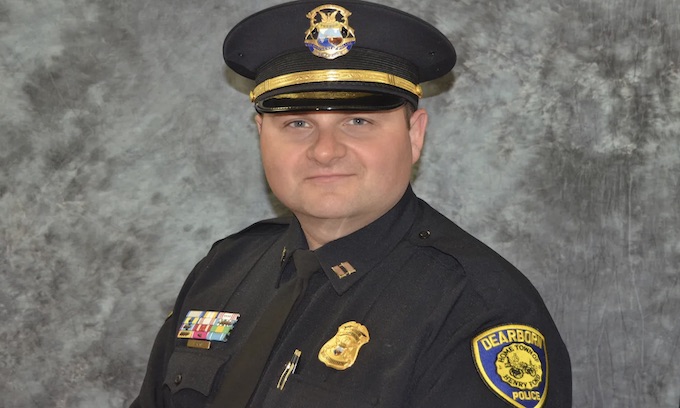Dearborn Mayor-elect Abdullah Hammoud announced Monday the appointment of a department veteran as the city’s next police chief.
Issa Shahin, the commanding officer of the department’s investigative division, will begin his role as Dearborn police chief on Jan. 1, the same day Hammoud assumes office, according to Jim Martinez, a spokesman for the mayor-elect.
Shahin is the city’s first Muslim police chief. Hammoud will be Dearborn’s first Muslim and Arab American mayor.
“Commander Shahin is the senior most executive commander with a strong track record and good rapport within the department,” said Hammoud in the announcement Monday in a press release. “He’s committed to building a trusting relationship with residents and delivering equitable policing in a way to best meet today’s demands in community policing.
“I am confident he will deliver the transparency and accountability residents expect while positioning our police officers for success.”
Appointments made by departing Mayor John B. O’Reilly Jr. expire in January, said Martinez.
Shahin is a 23-year veteran of the Dearborn Police Department and an Eastern Michigan University graduate. He said police had work to do to strengthen their relationship with residents.
“I look forward to working with the new mayor to address the concerns of residents in a meaningful way and tackle key issues such as reckless driving and mental health for residents and first-responders,” he said.
Shahin will succeed Ronald Haddad, who was appointed by O’Reilly and has served as chief since December 2008.
“Chief Haddad has served the city of Dearborn honorably for more than a decade, working hard to increase public safety and keep our neighborhoods and residents safe,” said Hammoud. “The city is thankful for his commitment to the job and his years of public service.”
Haddad could not immediately be reached for comment Monday night.
Hammoud called during his campaign for different approaches to policing, examples such as the city following a mental health response modeled after one in Eugene, Oregon, while also supporting civilian input.
Martinez said Monday that was still Hammoud’s plan for his administration, and that he and Shahin “share a vision that includes exploring innovative ways to best serve Dearborn residents.”
Hammoud also talked about examining potential disproportionate scrutiny of minorities by law enforcement and has advocated for balancing officers’ needs while investing in community services.
Policing and clashes in Dearborn have garnered controversy over the years.
The activists’ group Accountability for Dearborn has demanded city officials declare racism and police violence public health crises and require more transparency from the police.
Citing city data, members have said they believed police targeted African Americans at higher rates. They list as examples the deaths of Kevin Matthews in 2015 and Janet Wilson in 2016 during encounters with Dearborn police.
Officers in both cases were not criminally charged. Meanwhile, the city later reached settlements topping $1 million in lawsuits brought by relatives.
Haddad said earlier this year that his officers practice constitutional, colorblind policing.
“We don’t look at race when we issue violations,” Haddad said. “We go by the violations.”
He has said his department has added more minority officers and was the first in Michigan to adopt the ABLE (Active Bystandership for Law Enforcement) training, which teaches officers to intervene when they see colleagues having personal problems.
He also cowrote a Georgetown University white paper, “Building Trust Between Police and Community in Michigan: Lessons for the Nation from the Year 2020,” which explores how police can better serve the community, and it focused, in part, on police response to Black Lives Matter protests.
The Council on American-Islamic Relations, a national civil rights and advocacy group based in Washington, D.C., welcomed Shahin’s appointment, calling it and the election of Muslim candidates to public office a clear indication of the growing civic participation of American Muslims.
“Any time you have minority representation in law enforcement, I think it sends a good message to minority communities that they are represented and that you have people in leadership positions who are aware of their issues,” said national communications director Ibrahim Hooper.
___
(c)2021 The Detroit News
Visit The Detroit News at www.detnews.com
Distributed by Tribune Content Agency, LLC.
—-
This content is published through a licensing agreement with Acquire Media using its NewsEdge technology.



















Bad move
From the proud city that brought us Rashida Tiaib… I’ll put my money on this being a total disaster. Can anyone say Sharia Law?
Just wait until they officially declare Dearborn a Muslim Caliphate.
ALLUAHH Ackbar!!